Comprehensive Report on Risk Factors of Depression in Women
VerifiedAdded on 2023/06/13
|11
|3151
|377
Report
AI Summary
This report provides a comprehensive analysis of the risk factors associated with depression in women. It explores biological causes, highlighting hormonal changes and cultural factors that contribute to higher rates of depression in women. The report also examines the impact of malnutrition, noting the link between poor diet and depressive symptoms, and the role of stress, particularly during events like the COVID-19 pandemic. Furthermore, it discusses the influence of family history and genetics, emphasizing the increased risk of depression among individuals with a family history of the illness. Ethical considerations in studying depression are also addressed. The report concludes by advocating for preventive measures and interventions to address these risk factors effectively, aiming to improve women's mental health outcomes.
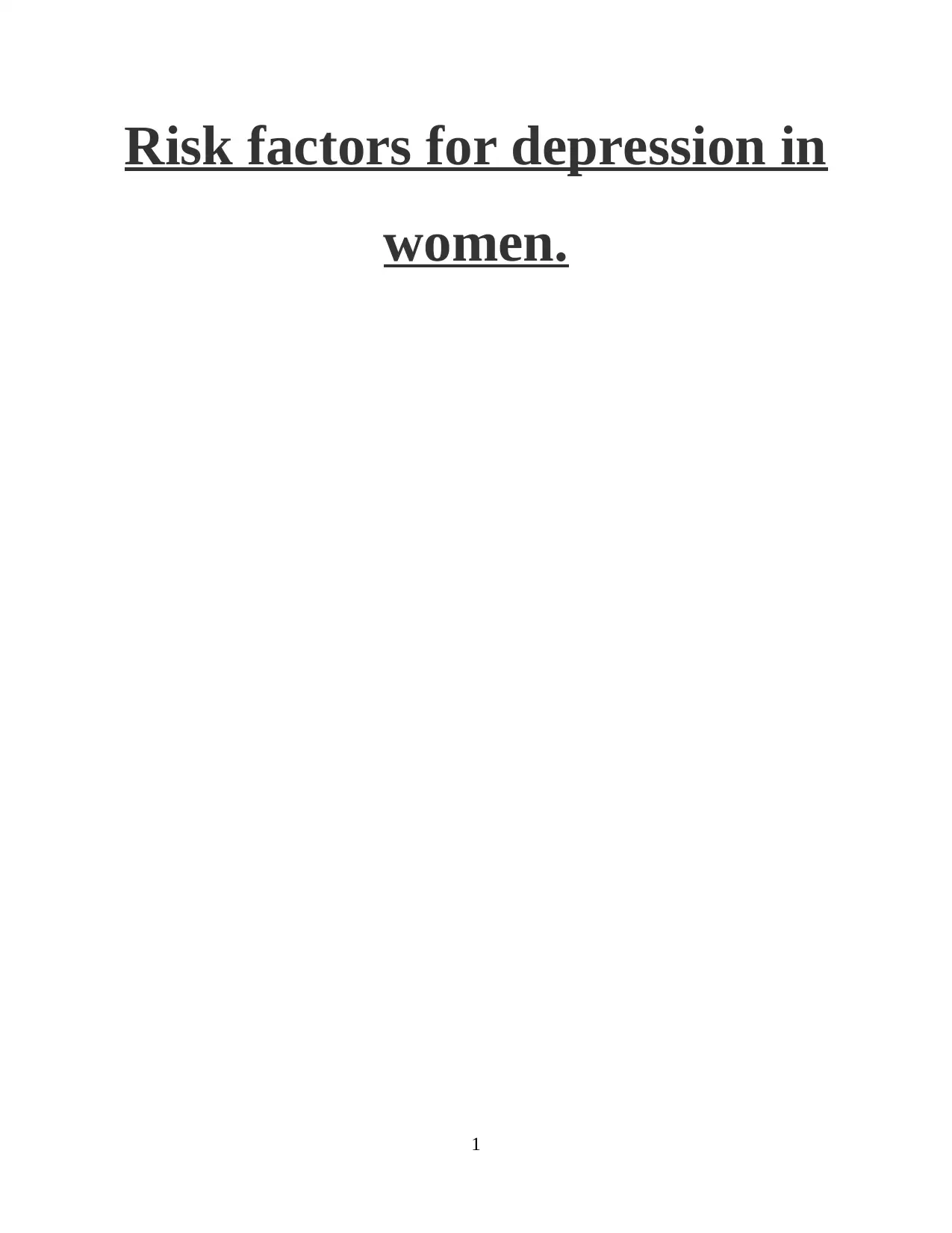
Risk factors for depression in
women.
1
women.
1
Paraphrase This Document
Need a fresh take? Get an instant paraphrase of this document with our AI Paraphraser
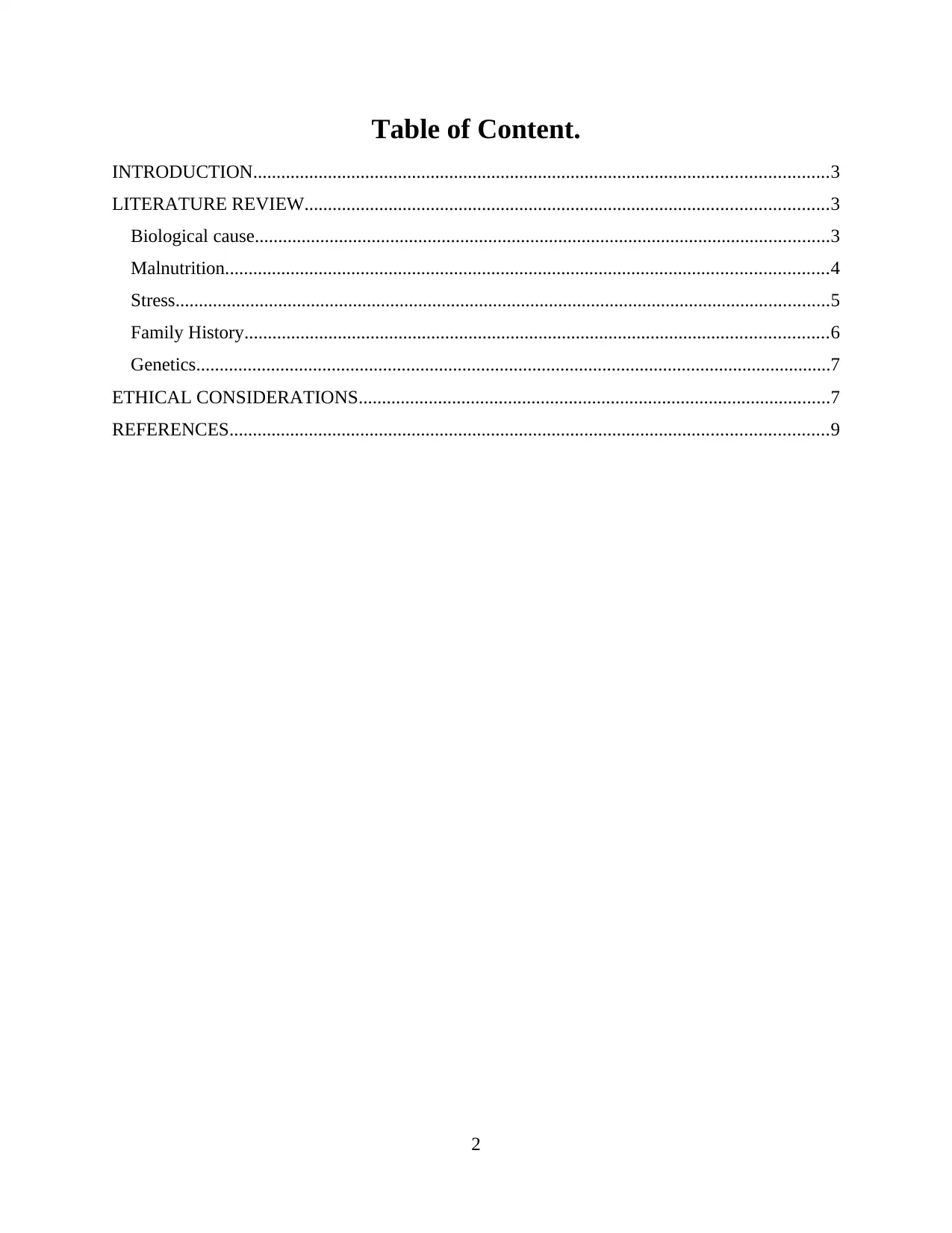
Table of Content.
INTRODUCTION...........................................................................................................................3
LITERATURE REVIEW................................................................................................................3
Biological cause...........................................................................................................................3
Malnutrition.................................................................................................................................4
Stress............................................................................................................................................5
Family History.............................................................................................................................6
Genetics........................................................................................................................................7
ETHICAL CONSIDERATIONS.....................................................................................................7
REFERENCES................................................................................................................................9
2
INTRODUCTION...........................................................................................................................3
LITERATURE REVIEW................................................................................................................3
Biological cause...........................................................................................................................3
Malnutrition.................................................................................................................................4
Stress............................................................................................................................................5
Family History.............................................................................................................................6
Genetics........................................................................................................................................7
ETHICAL CONSIDERATIONS.....................................................................................................7
REFERENCES................................................................................................................................9
2
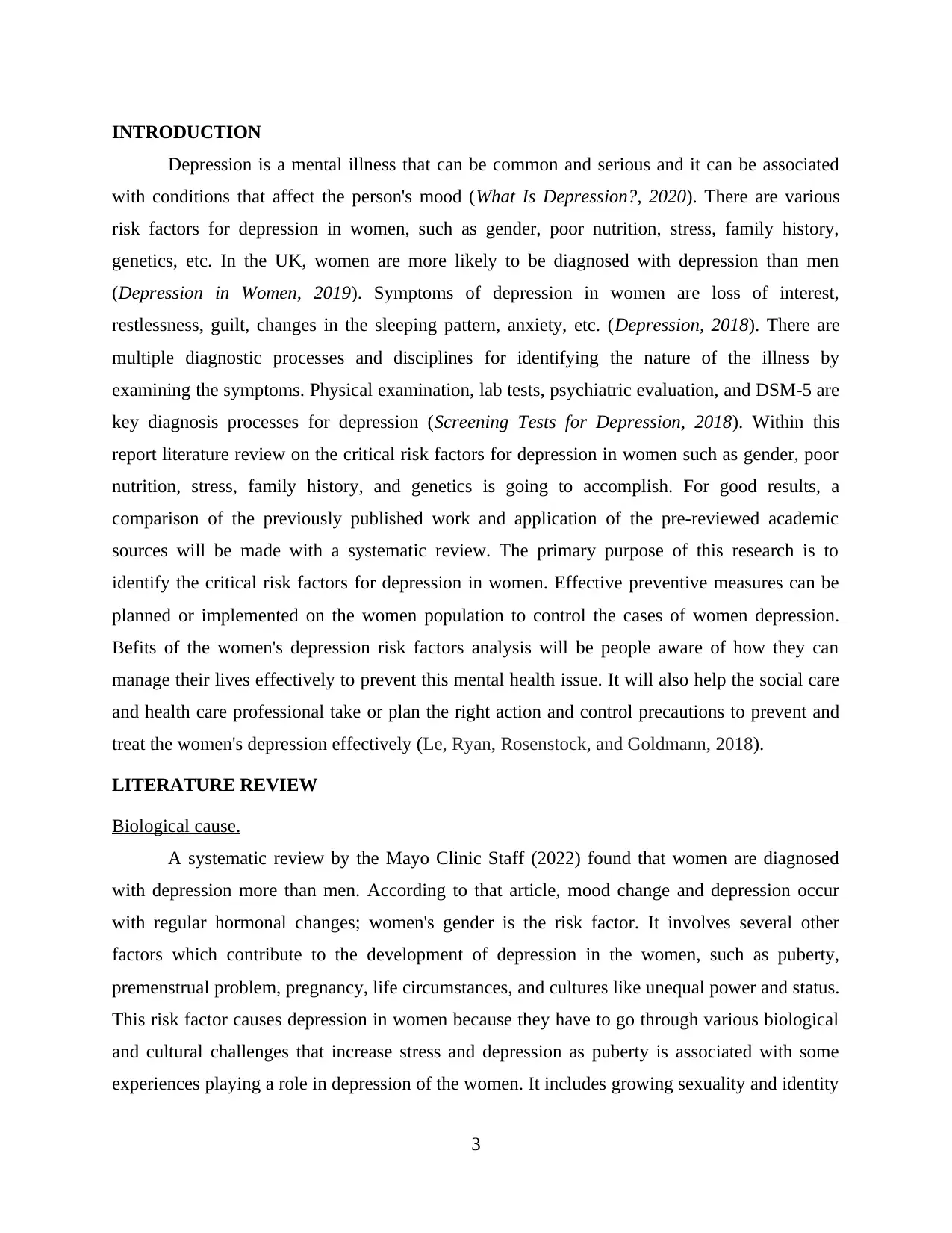
INTRODUCTION
Depression is a mental illness that can be common and serious and it can be associated
with conditions that affect the person's mood (What Is Depression?, 2020). There are various
risk factors for depression in women, such as gender, poor nutrition, stress, family history,
genetics, etc. In the UK, women are more likely to be diagnosed with depression than men
(Depression in Women, 2019). Symptoms of depression in women are loss of interest,
restlessness, guilt, changes in the sleeping pattern, anxiety, etc. (Depression, 2018). There are
multiple diagnostic processes and disciplines for identifying the nature of the illness by
examining the symptoms. Physical examination, lab tests, psychiatric evaluation, and DSM-5 are
key diagnosis processes for depression (Screening Tests for Depression, 2018). Within this
report literature review on the critical risk factors for depression in women such as gender, poor
nutrition, stress, family history, and genetics is going to accomplish. For good results, a
comparison of the previously published work and application of the pre-reviewed academic
sources will be made with a systematic review. The primary purpose of this research is to
identify the critical risk factors for depression in women. Effective preventive measures can be
planned or implemented on the women population to control the cases of women depression.
Befits of the women's depression risk factors analysis will be people aware of how they can
manage their lives effectively to prevent this mental health issue. It will also help the social care
and health care professional take or plan the right action and control precautions to prevent and
treat the women's depression effectively (Le, Ryan, Rosenstock, and Goldmann, 2018).
LITERATURE REVIEW
Biological cause.
A systematic review by the Mayo Clinic Staff (2022) found that women are diagnosed
with depression more than men. According to that article, mood change and depression occur
with regular hormonal changes; women's gender is the risk factor. It involves several other
factors which contribute to the development of depression in the women, such as puberty,
premenstrual problem, pregnancy, life circumstances, and cultures like unequal power and status.
This risk factor causes depression in women because they have to go through various biological
and cultural challenges that increase stress and depression as puberty is associated with some
experiences playing a role in depression of the women. It includes growing sexuality and identity
3
Depression is a mental illness that can be common and serious and it can be associated
with conditions that affect the person's mood (What Is Depression?, 2020). There are various
risk factors for depression in women, such as gender, poor nutrition, stress, family history,
genetics, etc. In the UK, women are more likely to be diagnosed with depression than men
(Depression in Women, 2019). Symptoms of depression in women are loss of interest,
restlessness, guilt, changes in the sleeping pattern, anxiety, etc. (Depression, 2018). There are
multiple diagnostic processes and disciplines for identifying the nature of the illness by
examining the symptoms. Physical examination, lab tests, psychiatric evaluation, and DSM-5 are
key diagnosis processes for depression (Screening Tests for Depression, 2018). Within this
report literature review on the critical risk factors for depression in women such as gender, poor
nutrition, stress, family history, and genetics is going to accomplish. For good results, a
comparison of the previously published work and application of the pre-reviewed academic
sources will be made with a systematic review. The primary purpose of this research is to
identify the critical risk factors for depression in women. Effective preventive measures can be
planned or implemented on the women population to control the cases of women depression.
Befits of the women's depression risk factors analysis will be people aware of how they can
manage their lives effectively to prevent this mental health issue. It will also help the social care
and health care professional take or plan the right action and control precautions to prevent and
treat the women's depression effectively (Le, Ryan, Rosenstock, and Goldmann, 2018).
LITERATURE REVIEW
Biological cause.
A systematic review by the Mayo Clinic Staff (2022) found that women are diagnosed
with depression more than men. According to that article, mood change and depression occur
with regular hormonal changes; women's gender is the risk factor. It involves several other
factors which contribute to the development of depression in the women, such as puberty,
premenstrual problem, pregnancy, life circumstances, and cultures like unequal power and status.
This risk factor causes depression in women because they have to go through various biological
and cultural challenges that increase stress and depression as puberty is associated with some
experiences playing a role in depression of the women. It includes growing sexuality and identity
3
⊘ This is a preview!⊘
Do you want full access?
Subscribe today to unlock all pages.

Trusted by 1+ million students worldwide
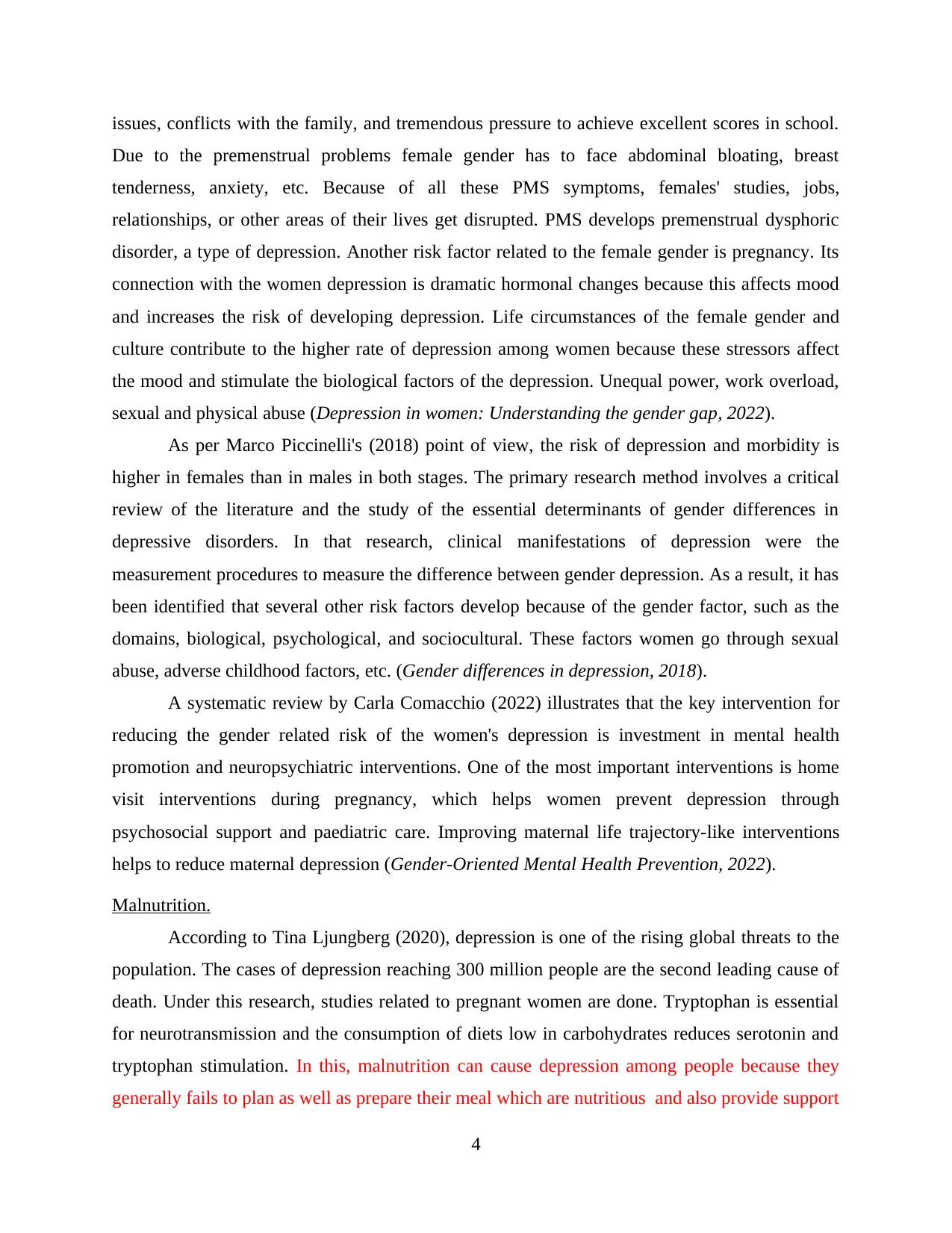
issues, conflicts with the family, and tremendous pressure to achieve excellent scores in school.
Due to the premenstrual problems female gender has to face abdominal bloating, breast
tenderness, anxiety, etc. Because of all these PMS symptoms, females' studies, jobs,
relationships, or other areas of their lives get disrupted. PMS develops premenstrual dysphoric
disorder, a type of depression. Another risk factor related to the female gender is pregnancy. Its
connection with the women depression is dramatic hormonal changes because this affects mood
and increases the risk of developing depression. Life circumstances of the female gender and
culture contribute to the higher rate of depression among women because these stressors affect
the mood and stimulate the biological factors of the depression. Unequal power, work overload,
sexual and physical abuse (Depression in women: Understanding the gender gap, 2022).
As per Marco Piccinelli's (2018) point of view, the risk of depression and morbidity is
higher in females than in males in both stages. The primary research method involves a critical
review of the literature and the study of the essential determinants of gender differences in
depressive disorders. In that research, clinical manifestations of depression were the
measurement procedures to measure the difference between gender depression. As a result, it has
been identified that several other risk factors develop because of the gender factor, such as the
domains, biological, psychological, and sociocultural. These factors women go through sexual
abuse, adverse childhood factors, etc. (Gender differences in depression, 2018).
A systematic review by Carla Comacchio (2022) illustrates that the key intervention for
reducing the gender related risk of the women's depression is investment in mental health
promotion and neuropsychiatric interventions. One of the most important interventions is home
visit interventions during pregnancy, which helps women prevent depression through
psychosocial support and paediatric care. Improving maternal life trajectory-like interventions
helps to reduce maternal depression (Gender-Oriented Mental Health Prevention, 2022).
Malnutrition.
According to Tina Ljungberg (2020), depression is one of the rising global threats to the
population. The cases of depression reaching 300 million people are the second leading cause of
death. Under this research, studies related to pregnant women are done. Tryptophan is essential
for neurotransmission and the consumption of diets low in carbohydrates reduces serotonin and
tryptophan stimulation. In this, malnutrition can cause depression among people because they
generally fails to plan as well as prepare their meal which are nutritious and also provide support
4
Due to the premenstrual problems female gender has to face abdominal bloating, breast
tenderness, anxiety, etc. Because of all these PMS symptoms, females' studies, jobs,
relationships, or other areas of their lives get disrupted. PMS develops premenstrual dysphoric
disorder, a type of depression. Another risk factor related to the female gender is pregnancy. Its
connection with the women depression is dramatic hormonal changes because this affects mood
and increases the risk of developing depression. Life circumstances of the female gender and
culture contribute to the higher rate of depression among women because these stressors affect
the mood and stimulate the biological factors of the depression. Unequal power, work overload,
sexual and physical abuse (Depression in women: Understanding the gender gap, 2022).
As per Marco Piccinelli's (2018) point of view, the risk of depression and morbidity is
higher in females than in males in both stages. The primary research method involves a critical
review of the literature and the study of the essential determinants of gender differences in
depressive disorders. In that research, clinical manifestations of depression were the
measurement procedures to measure the difference between gender depression. As a result, it has
been identified that several other risk factors develop because of the gender factor, such as the
domains, biological, psychological, and sociocultural. These factors women go through sexual
abuse, adverse childhood factors, etc. (Gender differences in depression, 2018).
A systematic review by Carla Comacchio (2022) illustrates that the key intervention for
reducing the gender related risk of the women's depression is investment in mental health
promotion and neuropsychiatric interventions. One of the most important interventions is home
visit interventions during pregnancy, which helps women prevent depression through
psychosocial support and paediatric care. Improving maternal life trajectory-like interventions
helps to reduce maternal depression (Gender-Oriented Mental Health Prevention, 2022).
Malnutrition.
According to Tina Ljungberg (2020), depression is one of the rising global threats to the
population. The cases of depression reaching 300 million people are the second leading cause of
death. Under this research, studies related to pregnant women are done. Tryptophan is essential
for neurotransmission and the consumption of diets low in carbohydrates reduces serotonin and
tryptophan stimulation. In this, malnutrition can cause depression among people because they
generally fails to plan as well as prepare their meal which are nutritious and also provide support
4
Paraphrase This Document
Need a fresh take? Get an instant paraphrase of this document with our AI Paraphraser
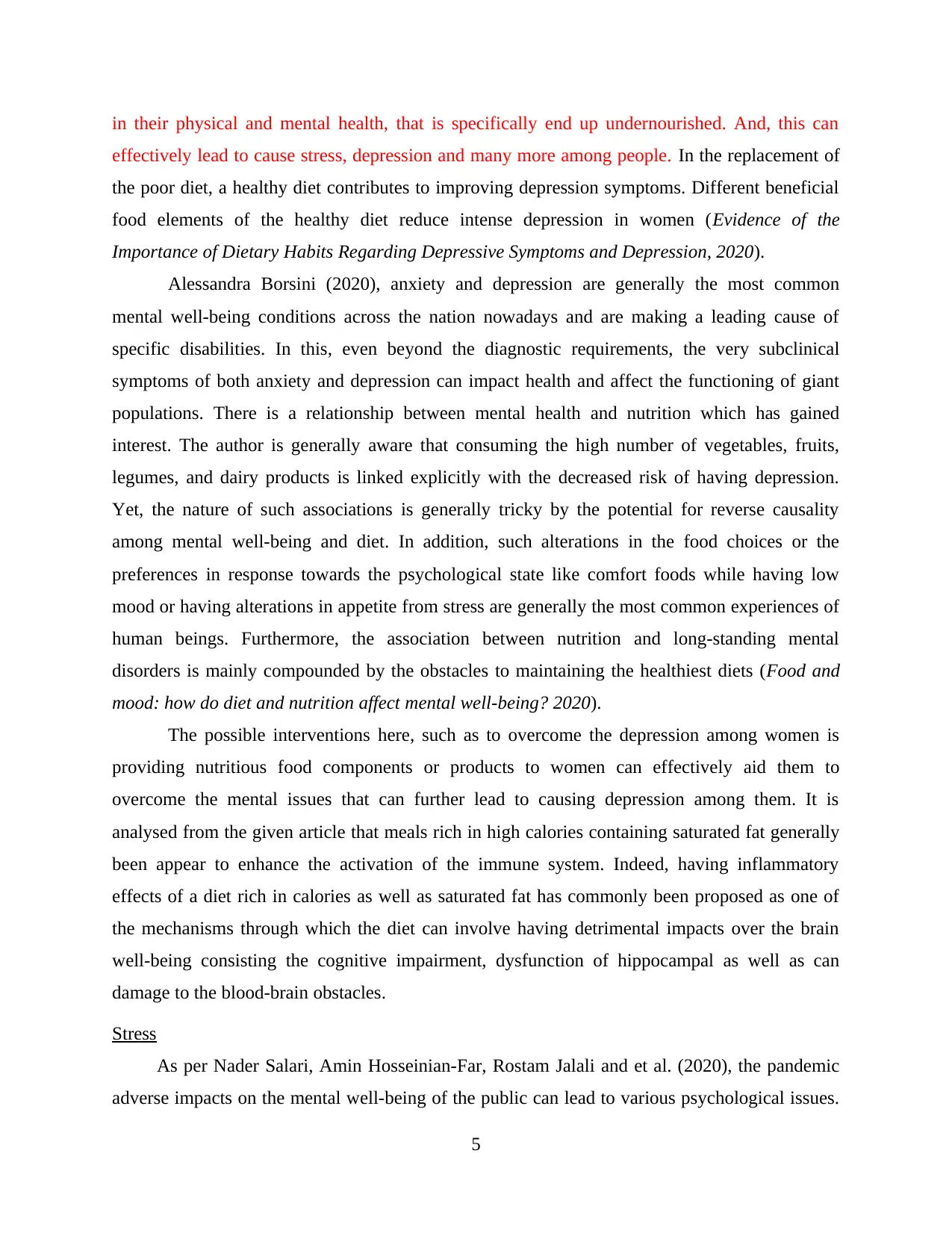
in their physical and mental health, that is specifically end up undernourished. And, this can
effectively lead to cause stress, depression and many more among people. In the replacement of
the poor diet, a healthy diet contributes to improving depression symptoms. Different beneficial
food elements of the healthy diet reduce intense depression in women (Evidence of the
Importance of Dietary Habits Regarding Depressive Symptoms and Depression, 2020).
Alessandra Borsini (2020), anxiety and depression are generally the most common
mental well-being conditions across the nation nowadays and are making a leading cause of
specific disabilities. In this, even beyond the diagnostic requirements, the very subclinical
symptoms of both anxiety and depression can impact health and affect the functioning of giant
populations. There is a relationship between mental health and nutrition which has gained
interest. The author is generally aware that consuming the high number of vegetables, fruits,
legumes, and dairy products is linked explicitly with the decreased risk of having depression.
Yet, the nature of such associations is generally tricky by the potential for reverse causality
among mental well-being and diet. In addition, such alterations in the food choices or the
preferences in response towards the psychological state like comfort foods while having low
mood or having alterations in appetite from stress are generally the most common experiences of
human beings. Furthermore, the association between nutrition and long-standing mental
disorders is mainly compounded by the obstacles to maintaining the healthiest diets (Food and
mood: how do diet and nutrition affect mental well-being? 2020).
The possible interventions here, such as to overcome the depression among women is
providing nutritious food components or products to women can effectively aid them to
overcome the mental issues that can further lead to causing depression among them. It is
analysed from the given article that meals rich in high calories containing saturated fat generally
been appear to enhance the activation of the immune system. Indeed, having inflammatory
effects of a diet rich in calories as well as saturated fat has commonly been proposed as one of
the mechanisms through which the diet can involve having detrimental impacts over the brain
well-being consisting the cognitive impairment, dysfunction of hippocampal as well as can
damage to the blood-brain obstacles.
Stress
As per Nader Salari, Amin Hosseinian-Far, Rostam Jalali and et al. (2020), the pandemic
adverse impacts on the mental well-being of the public can lead to various psychological issues.
5
effectively lead to cause stress, depression and many more among people. In the replacement of
the poor diet, a healthy diet contributes to improving depression symptoms. Different beneficial
food elements of the healthy diet reduce intense depression in women (Evidence of the
Importance of Dietary Habits Regarding Depressive Symptoms and Depression, 2020).
Alessandra Borsini (2020), anxiety and depression are generally the most common
mental well-being conditions across the nation nowadays and are making a leading cause of
specific disabilities. In this, even beyond the diagnostic requirements, the very subclinical
symptoms of both anxiety and depression can impact health and affect the functioning of giant
populations. There is a relationship between mental health and nutrition which has gained
interest. The author is generally aware that consuming the high number of vegetables, fruits,
legumes, and dairy products is linked explicitly with the decreased risk of having depression.
Yet, the nature of such associations is generally tricky by the potential for reverse causality
among mental well-being and diet. In addition, such alterations in the food choices or the
preferences in response towards the psychological state like comfort foods while having low
mood or having alterations in appetite from stress are generally the most common experiences of
human beings. Furthermore, the association between nutrition and long-standing mental
disorders is mainly compounded by the obstacles to maintaining the healthiest diets (Food and
mood: how do diet and nutrition affect mental well-being? 2020).
The possible interventions here, such as to overcome the depression among women is
providing nutritious food components or products to women can effectively aid them to
overcome the mental issues that can further lead to causing depression among them. It is
analysed from the given article that meals rich in high calories containing saturated fat generally
been appear to enhance the activation of the immune system. Indeed, having inflammatory
effects of a diet rich in calories as well as saturated fat has commonly been proposed as one of
the mechanisms through which the diet can involve having detrimental impacts over the brain
well-being consisting the cognitive impairment, dysfunction of hippocampal as well as can
damage to the blood-brain obstacles.
Stress
As per Nader Salari, Amin Hosseinian-Far, Rostam Jalali and et al. (2020), the pandemic
adverse impacts on the mental well-being of the public can lead to various psychological issues.
5
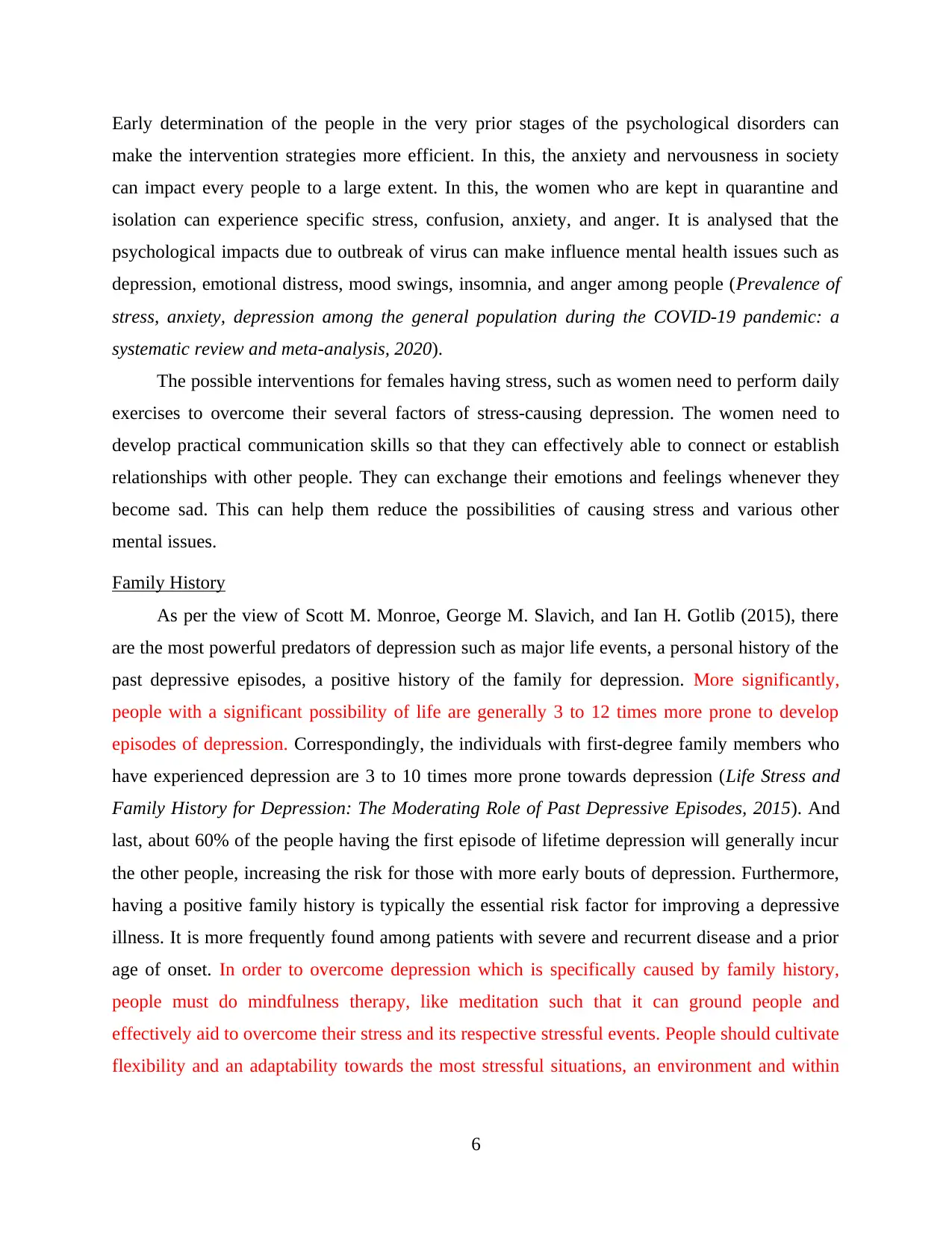
Early determination of the people in the very prior stages of the psychological disorders can
make the intervention strategies more efficient. In this, the anxiety and nervousness in society
can impact every people to a large extent. In this, the women who are kept in quarantine and
isolation can experience specific stress, confusion, anxiety, and anger. It is analysed that the
psychological impacts due to outbreak of virus can make influence mental health issues such as
depression, emotional distress, mood swings, insomnia, and anger among people (Prevalence of
stress, anxiety, depression among the general population during the COVID-19 pandemic: a
systematic review and meta-analysis, 2020).
The possible interventions for females having stress, such as women need to perform daily
exercises to overcome their several factors of stress-causing depression. The women need to
develop practical communication skills so that they can effectively able to connect or establish
relationships with other people. They can exchange their emotions and feelings whenever they
become sad. This can help them reduce the possibilities of causing stress and various other
mental issues.
Family History
As per the view of Scott M. Monroe, George M. Slavich, and Ian H. Gotlib (2015), there
are the most powerful predators of depression such as major life events, a personal history of the
past depressive episodes, a positive history of the family for depression. More significantly,
people with a significant possibility of life are generally 3 to 12 times more prone to develop
episodes of depression. Correspondingly, the individuals with first-degree family members who
have experienced depression are 3 to 10 times more prone towards depression (Life Stress and
Family History for Depression: The Moderating Role of Past Depressive Episodes, 2015). And
last, about 60% of the people having the first episode of lifetime depression will generally incur
the other people, increasing the risk for those with more early bouts of depression. Furthermore,
having a positive family history is typically the essential risk factor for improving a depressive
illness. It is more frequently found among patients with severe and recurrent disease and a prior
age of onset. In order to overcome depression which is specifically caused by family history,
people must do mindfulness therapy, like meditation such that it can ground people and
effectively aid to overcome their stress and its respective stressful events. People should cultivate
flexibility and an adaptability towards the most stressful situations, an environment and within
6
make the intervention strategies more efficient. In this, the anxiety and nervousness in society
can impact every people to a large extent. In this, the women who are kept in quarantine and
isolation can experience specific stress, confusion, anxiety, and anger. It is analysed that the
psychological impacts due to outbreak of virus can make influence mental health issues such as
depression, emotional distress, mood swings, insomnia, and anger among people (Prevalence of
stress, anxiety, depression among the general population during the COVID-19 pandemic: a
systematic review and meta-analysis, 2020).
The possible interventions for females having stress, such as women need to perform daily
exercises to overcome their several factors of stress-causing depression. The women need to
develop practical communication skills so that they can effectively able to connect or establish
relationships with other people. They can exchange their emotions and feelings whenever they
become sad. This can help them reduce the possibilities of causing stress and various other
mental issues.
Family History
As per the view of Scott M. Monroe, George M. Slavich, and Ian H. Gotlib (2015), there
are the most powerful predators of depression such as major life events, a personal history of the
past depressive episodes, a positive history of the family for depression. More significantly,
people with a significant possibility of life are generally 3 to 12 times more prone to develop
episodes of depression. Correspondingly, the individuals with first-degree family members who
have experienced depression are 3 to 10 times more prone towards depression (Life Stress and
Family History for Depression: The Moderating Role of Past Depressive Episodes, 2015). And
last, about 60% of the people having the first episode of lifetime depression will generally incur
the other people, increasing the risk for those with more early bouts of depression. Furthermore,
having a positive family history is typically the essential risk factor for improving a depressive
illness. It is more frequently found among patients with severe and recurrent disease and a prior
age of onset. In order to overcome depression which is specifically caused by family history,
people must do mindfulness therapy, like meditation such that it can ground people and
effectively aid to overcome their stress and its respective stressful events. People should cultivate
flexibility and an adaptability towards the most stressful situations, an environment and within
6
⊘ This is a preview!⊘
Do you want full access?
Subscribe today to unlock all pages.

Trusted by 1+ million students worldwide
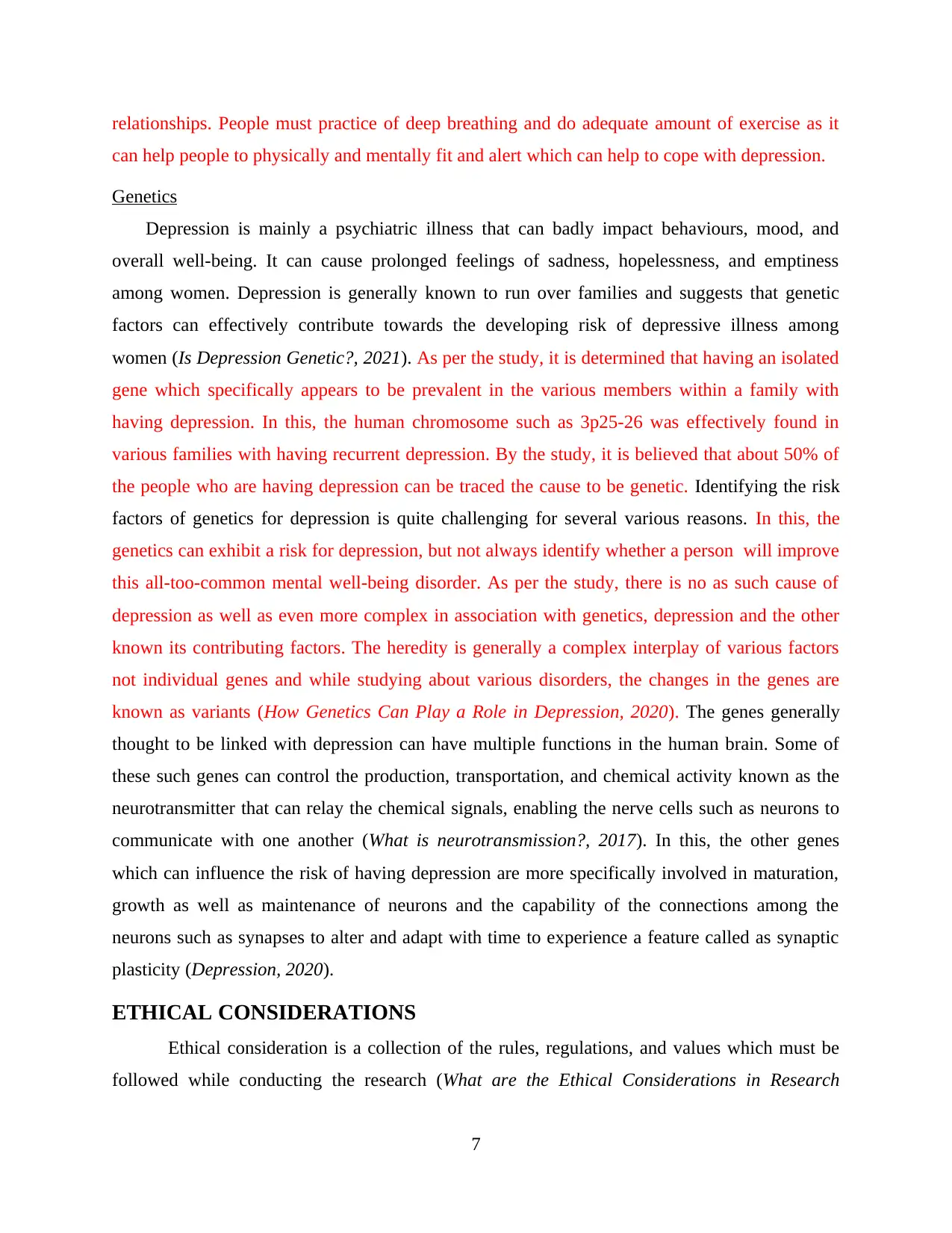
relationships. People must practice of deep breathing and do adequate amount of exercise as it
can help people to physically and mentally fit and alert which can help to cope with depression.
Genetics
Depression is mainly a psychiatric illness that can badly impact behaviours, mood, and
overall well-being. It can cause prolonged feelings of sadness, hopelessness, and emptiness
among women. Depression is generally known to run over families and suggests that genetic
factors can effectively contribute towards the developing risk of depressive illness among
women (Is Depression Genetic?, 2021). As per the study, it is determined that having an isolated
gene which specifically appears to be prevalent in the various members within a family with
having depression. In this, the human chromosome such as 3p25-26 was effectively found in
various families with having recurrent depression. By the study, it is believed that about 50% of
the people who are having depression can be traced the cause to be genetic. Identifying the risk
factors of genetics for depression is quite challenging for several various reasons. In this, the
genetics can exhibit a risk for depression, but not always identify whether a person will improve
this all-too-common mental well-being disorder. As per the study, there is no as such cause of
depression as well as even more complex in association with genetics, depression and the other
known its contributing factors. The heredity is generally a complex interplay of various factors
not individual genes and while studying about various disorders, the changes in the genes are
known as variants (How Genetics Can Play a Role in Depression, 2020). The genes generally
thought to be linked with depression can have multiple functions in the human brain. Some of
these such genes can control the production, transportation, and chemical activity known as the
neurotransmitter that can relay the chemical signals, enabling the nerve cells such as neurons to
communicate with one another (What is neurotransmission?, 2017). In this, the other genes
which can influence the risk of having depression are more specifically involved in maturation,
growth as well as maintenance of neurons and the capability of the connections among the
neurons such as synapses to alter and adapt with time to experience a feature called as synaptic
plasticity (Depression, 2020).
ETHICAL CONSIDERATIONS
Ethical consideration is a collection of the rules, regulations, and values which must be
followed while conducting the research (What are the Ethical Considerations in Research
7
can help people to physically and mentally fit and alert which can help to cope with depression.
Genetics
Depression is mainly a psychiatric illness that can badly impact behaviours, mood, and
overall well-being. It can cause prolonged feelings of sadness, hopelessness, and emptiness
among women. Depression is generally known to run over families and suggests that genetic
factors can effectively contribute towards the developing risk of depressive illness among
women (Is Depression Genetic?, 2021). As per the study, it is determined that having an isolated
gene which specifically appears to be prevalent in the various members within a family with
having depression. In this, the human chromosome such as 3p25-26 was effectively found in
various families with having recurrent depression. By the study, it is believed that about 50% of
the people who are having depression can be traced the cause to be genetic. Identifying the risk
factors of genetics for depression is quite challenging for several various reasons. In this, the
genetics can exhibit a risk for depression, but not always identify whether a person will improve
this all-too-common mental well-being disorder. As per the study, there is no as such cause of
depression as well as even more complex in association with genetics, depression and the other
known its contributing factors. The heredity is generally a complex interplay of various factors
not individual genes and while studying about various disorders, the changes in the genes are
known as variants (How Genetics Can Play a Role in Depression, 2020). The genes generally
thought to be linked with depression can have multiple functions in the human brain. Some of
these such genes can control the production, transportation, and chemical activity known as the
neurotransmitter that can relay the chemical signals, enabling the nerve cells such as neurons to
communicate with one another (What is neurotransmission?, 2017). In this, the other genes
which can influence the risk of having depression are more specifically involved in maturation,
growth as well as maintenance of neurons and the capability of the connections among the
neurons such as synapses to alter and adapt with time to experience a feature called as synaptic
plasticity (Depression, 2020).
ETHICAL CONSIDERATIONS
Ethical consideration is a collection of the rules, regulations, and values which must be
followed while conducting the research (What are the Ethical Considerations in Research
7
Paraphrase This Document
Need a fresh take? Get an instant paraphrase of this document with our AI Paraphraser
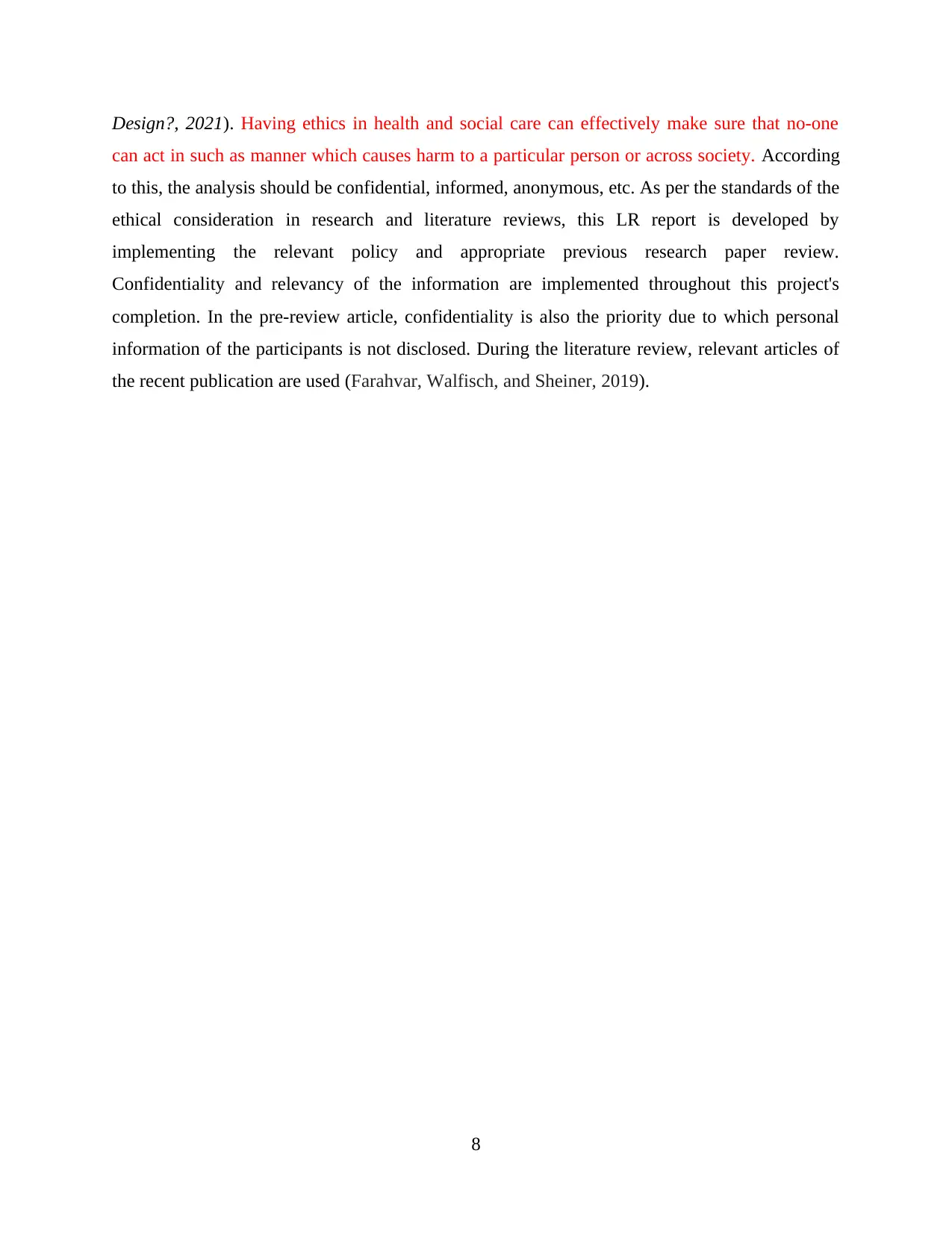
Design?, 2021). Having ethics in health and social care can effectively make sure that no-one
can act in such as manner which causes harm to a particular person or across society. According
to this, the analysis should be confidential, informed, anonymous, etc. As per the standards of the
ethical consideration in research and literature reviews, this LR report is developed by
implementing the relevant policy and appropriate previous research paper review.
Confidentiality and relevancy of the information are implemented throughout this project's
completion. In the pre-review article, confidentiality is also the priority due to which personal
information of the participants is not disclosed. During the literature review, relevant articles of
the recent publication are used (Farahvar, Walfisch, and Sheiner, 2019).
8
can act in such as manner which causes harm to a particular person or across society. According
to this, the analysis should be confidential, informed, anonymous, etc. As per the standards of the
ethical consideration in research and literature reviews, this LR report is developed by
implementing the relevant policy and appropriate previous research paper review.
Confidentiality and relevancy of the information are implemented throughout this project's
completion. In the pre-review article, confidentiality is also the priority due to which personal
information of the participants is not disclosed. During the literature review, relevant articles of
the recent publication are used (Farahvar, Walfisch, and Sheiner, 2019).
8
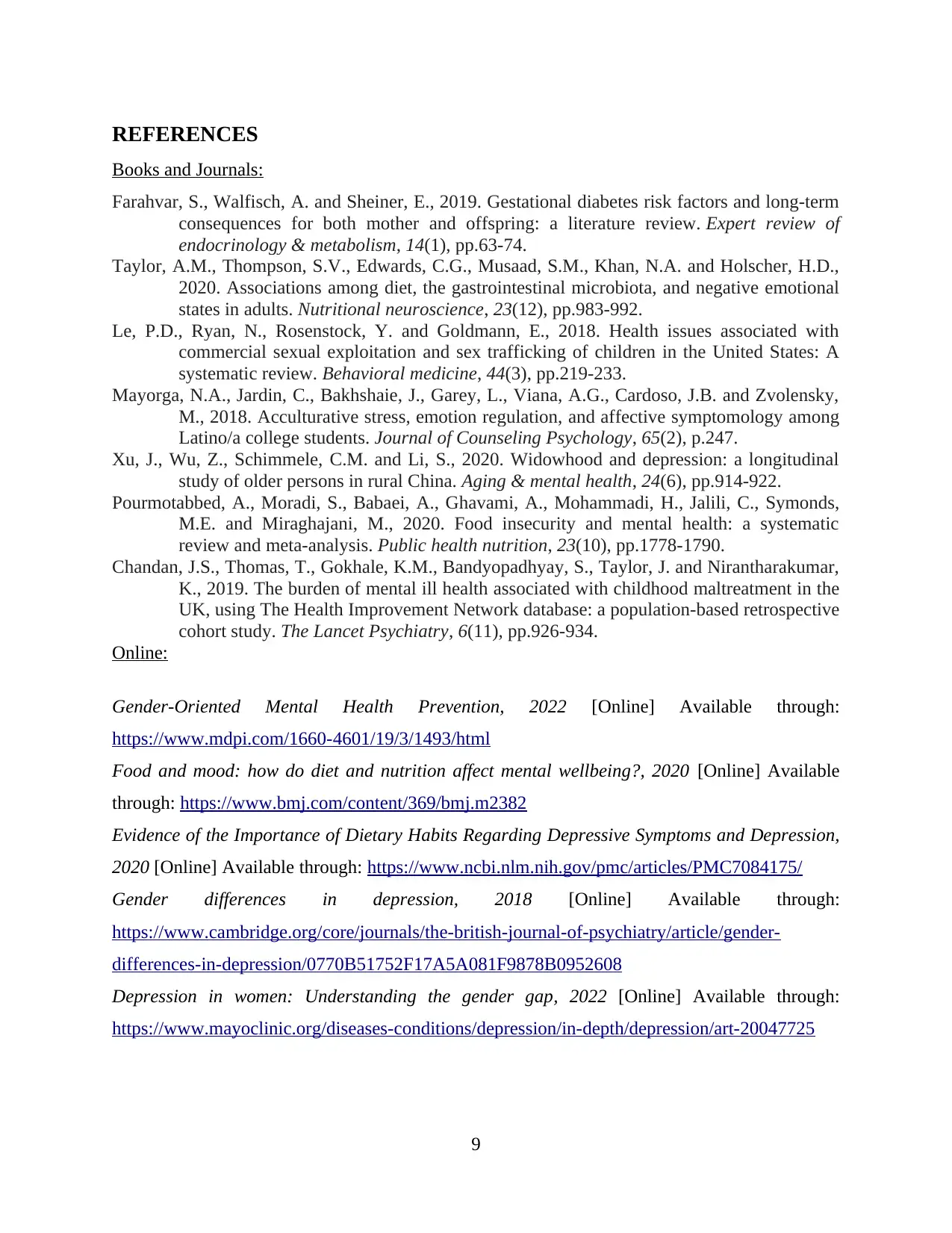
REFERENCES
Books and Journals:
Farahvar, S., Walfisch, A. and Sheiner, E., 2019. Gestational diabetes risk factors and long-term
consequences for both mother and offspring: a literature review. Expert review of
endocrinology & metabolism, 14(1), pp.63-74.
Taylor, A.M., Thompson, S.V., Edwards, C.G., Musaad, S.M., Khan, N.A. and Holscher, H.D.,
2020. Associations among diet, the gastrointestinal microbiota, and negative emotional
states in adults. Nutritional neuroscience, 23(12), pp.983-992.
Le, P.D., Ryan, N., Rosenstock, Y. and Goldmann, E., 2018. Health issues associated with
commercial sexual exploitation and sex trafficking of children in the United States: A
systematic review. Behavioral medicine, 44(3), pp.219-233.
Mayorga, N.A., Jardin, C., Bakhshaie, J., Garey, L., Viana, A.G., Cardoso, J.B. and Zvolensky,
M., 2018. Acculturative stress, emotion regulation, and affective symptomology among
Latino/a college students. Journal of Counseling Psychology, 65(2), p.247.
Xu, J., Wu, Z., Schimmele, C.M. and Li, S., 2020. Widowhood and depression: a longitudinal
study of older persons in rural China. Aging & mental health, 24(6), pp.914-922.
Pourmotabbed, A., Moradi, S., Babaei, A., Ghavami, A., Mohammadi, H., Jalili, C., Symonds,
M.E. and Miraghajani, M., 2020. Food insecurity and mental health: a systematic
review and meta-analysis. Public health nutrition, 23(10), pp.1778-1790.
Chandan, J.S., Thomas, T., Gokhale, K.M., Bandyopadhyay, S., Taylor, J. and Nirantharakumar,
K., 2019. The burden of mental ill health associated with childhood maltreatment in the
UK, using The Health Improvement Network database: a population-based retrospective
cohort study. The Lancet Psychiatry, 6(11), pp.926-934.
Online:
Gender-Oriented Mental Health Prevention, 2022 [Online] Available through:
https://www.mdpi.com/1660-4601/19/3/1493/html
Food and mood: how do diet and nutrition affect mental wellbeing?, 2020 [Online] Available
through: https://www.bmj.com/content/369/bmj.m2382
Evidence of the Importance of Dietary Habits Regarding Depressive Symptoms and Depression,
2020 [Online] Available through: https://www.ncbi.nlm.nih.gov/pmc/articles/PMC7084175/
Gender differences in depression, 2018 [Online] Available through:
https://www.cambridge.org/core/journals/the-british-journal-of-psychiatry/article/gender-
differences-in-depression/0770B51752F17A5A081F9878B0952608
Depression in women: Understanding the gender gap, 2022 [Online] Available through:
https://www.mayoclinic.org/diseases-conditions/depression/in-depth/depression/art-20047725
9
Books and Journals:
Farahvar, S., Walfisch, A. and Sheiner, E., 2019. Gestational diabetes risk factors and long-term
consequences for both mother and offspring: a literature review. Expert review of
endocrinology & metabolism, 14(1), pp.63-74.
Taylor, A.M., Thompson, S.V., Edwards, C.G., Musaad, S.M., Khan, N.A. and Holscher, H.D.,
2020. Associations among diet, the gastrointestinal microbiota, and negative emotional
states in adults. Nutritional neuroscience, 23(12), pp.983-992.
Le, P.D., Ryan, N., Rosenstock, Y. and Goldmann, E., 2018. Health issues associated with
commercial sexual exploitation and sex trafficking of children in the United States: A
systematic review. Behavioral medicine, 44(3), pp.219-233.
Mayorga, N.A., Jardin, C., Bakhshaie, J., Garey, L., Viana, A.G., Cardoso, J.B. and Zvolensky,
M., 2018. Acculturative stress, emotion regulation, and affective symptomology among
Latino/a college students. Journal of Counseling Psychology, 65(2), p.247.
Xu, J., Wu, Z., Schimmele, C.M. and Li, S., 2020. Widowhood and depression: a longitudinal
study of older persons in rural China. Aging & mental health, 24(6), pp.914-922.
Pourmotabbed, A., Moradi, S., Babaei, A., Ghavami, A., Mohammadi, H., Jalili, C., Symonds,
M.E. and Miraghajani, M., 2020. Food insecurity and mental health: a systematic
review and meta-analysis. Public health nutrition, 23(10), pp.1778-1790.
Chandan, J.S., Thomas, T., Gokhale, K.M., Bandyopadhyay, S., Taylor, J. and Nirantharakumar,
K., 2019. The burden of mental ill health associated with childhood maltreatment in the
UK, using The Health Improvement Network database: a population-based retrospective
cohort study. The Lancet Psychiatry, 6(11), pp.926-934.
Online:
Gender-Oriented Mental Health Prevention, 2022 [Online] Available through:
https://www.mdpi.com/1660-4601/19/3/1493/html
Food and mood: how do diet and nutrition affect mental wellbeing?, 2020 [Online] Available
through: https://www.bmj.com/content/369/bmj.m2382
Evidence of the Importance of Dietary Habits Regarding Depressive Symptoms and Depression,
2020 [Online] Available through: https://www.ncbi.nlm.nih.gov/pmc/articles/PMC7084175/
Gender differences in depression, 2018 [Online] Available through:
https://www.cambridge.org/core/journals/the-british-journal-of-psychiatry/article/gender-
differences-in-depression/0770B51752F17A5A081F9878B0952608
Depression in women: Understanding the gender gap, 2022 [Online] Available through:
https://www.mayoclinic.org/diseases-conditions/depression/in-depth/depression/art-20047725
9
⊘ This is a preview!⊘
Do you want full access?
Subscribe today to unlock all pages.

Trusted by 1+ million students worldwide
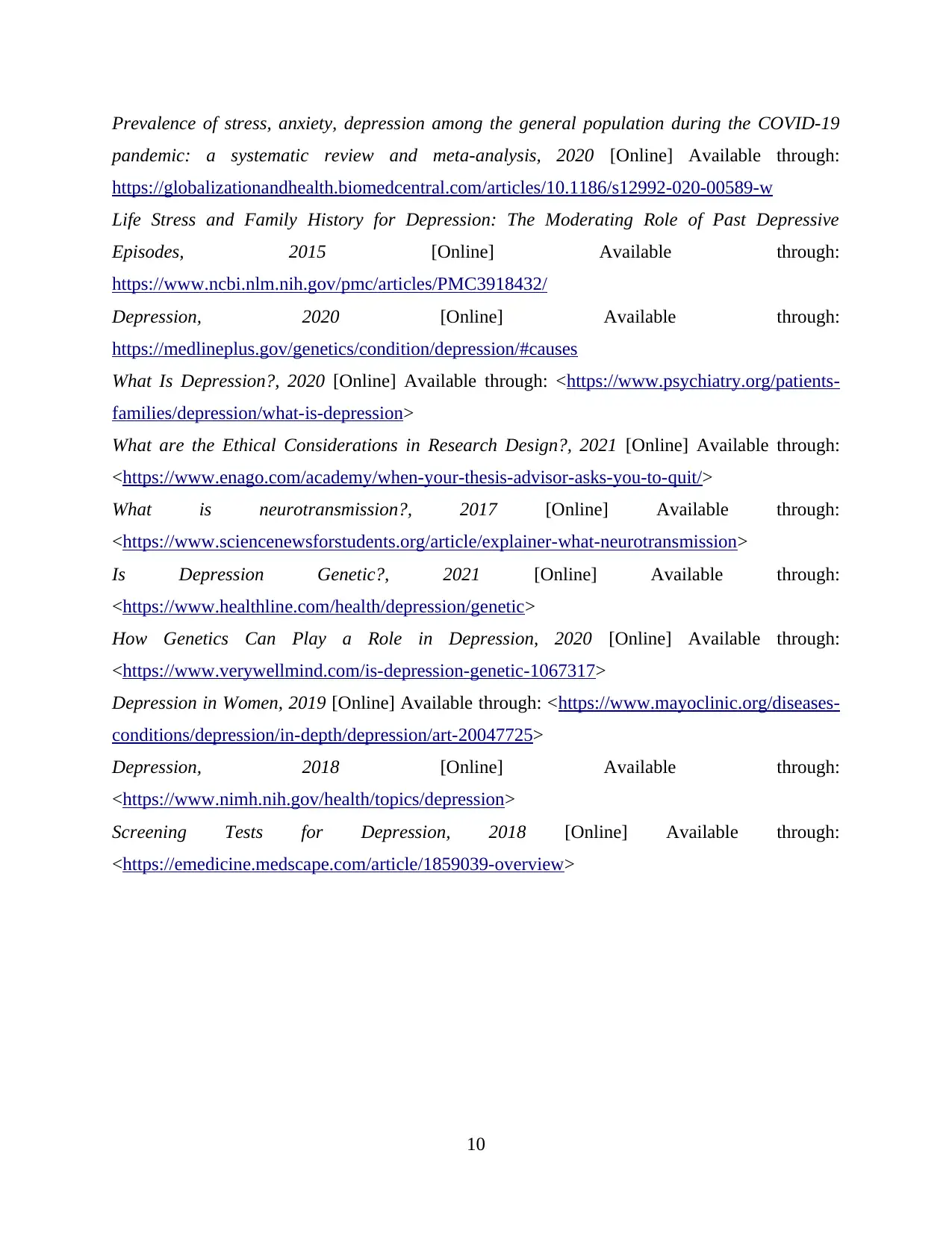
Prevalence of stress, anxiety, depression among the general population during the COVID-19
pandemic: a systematic review and meta-analysis, 2020 [Online] Available through:
https://globalizationandhealth.biomedcentral.com/articles/10.1186/s12992-020-00589-w
Life Stress and Family History for Depression: The Moderating Role of Past Depressive
Episodes, 2015 [Online] Available through:
https://www.ncbi.nlm.nih.gov/pmc/articles/PMC3918432/
Depression, 2020 [Online] Available through:
https://medlineplus.gov/genetics/condition/depression/#causes
What Is Depression?, 2020 [Online] Available through: <https://www.psychiatry.org/patients-
families/depression/what-is-depression>
What are the Ethical Considerations in Research Design?, 2021 [Online] Available through:
<https://www.enago.com/academy/when-your-thesis-advisor-asks-you-to-quit/>
What is neurotransmission?, 2017 [Online] Available through:
<https://www.sciencenewsforstudents.org/article/explainer-what-neurotransmission>
Is Depression Genetic?, 2021 [Online] Available through:
<https://www.healthline.com/health/depression/genetic>
How Genetics Can Play a Role in Depression, 2020 [Online] Available through:
<https://www.verywellmind.com/is-depression-genetic-1067317>
Depression in Women, 2019 [Online] Available through: <https://www.mayoclinic.org/diseases-
conditions/depression/in-depth/depression/art-20047725>
Depression, 2018 [Online] Available through:
<https://www.nimh.nih.gov/health/topics/depression>
Screening Tests for Depression, 2018 [Online] Available through:
<https://emedicine.medscape.com/article/1859039-overview>
10
pandemic: a systematic review and meta-analysis, 2020 [Online] Available through:
https://globalizationandhealth.biomedcentral.com/articles/10.1186/s12992-020-00589-w
Life Stress and Family History for Depression: The Moderating Role of Past Depressive
Episodes, 2015 [Online] Available through:
https://www.ncbi.nlm.nih.gov/pmc/articles/PMC3918432/
Depression, 2020 [Online] Available through:
https://medlineplus.gov/genetics/condition/depression/#causes
What Is Depression?, 2020 [Online] Available through: <https://www.psychiatry.org/patients-
families/depression/what-is-depression>
What are the Ethical Considerations in Research Design?, 2021 [Online] Available through:
<https://www.enago.com/academy/when-your-thesis-advisor-asks-you-to-quit/>
What is neurotransmission?, 2017 [Online] Available through:
<https://www.sciencenewsforstudents.org/article/explainer-what-neurotransmission>
Is Depression Genetic?, 2021 [Online] Available through:
<https://www.healthline.com/health/depression/genetic>
How Genetics Can Play a Role in Depression, 2020 [Online] Available through:
<https://www.verywellmind.com/is-depression-genetic-1067317>
Depression in Women, 2019 [Online] Available through: <https://www.mayoclinic.org/diseases-
conditions/depression/in-depth/depression/art-20047725>
Depression, 2018 [Online] Available through:
<https://www.nimh.nih.gov/health/topics/depression>
Screening Tests for Depression, 2018 [Online] Available through:
<https://emedicine.medscape.com/article/1859039-overview>
10
Paraphrase This Document
Need a fresh take? Get an instant paraphrase of this document with our AI Paraphraser

11
1 out of 11
Related Documents
Your All-in-One AI-Powered Toolkit for Academic Success.
+13062052269
info@desklib.com
Available 24*7 on WhatsApp / Email
![[object Object]](/_next/static/media/star-bottom.7253800d.svg)
Unlock your academic potential
Copyright © 2020–2026 A2Z Services. All Rights Reserved. Developed and managed by ZUCOL.





